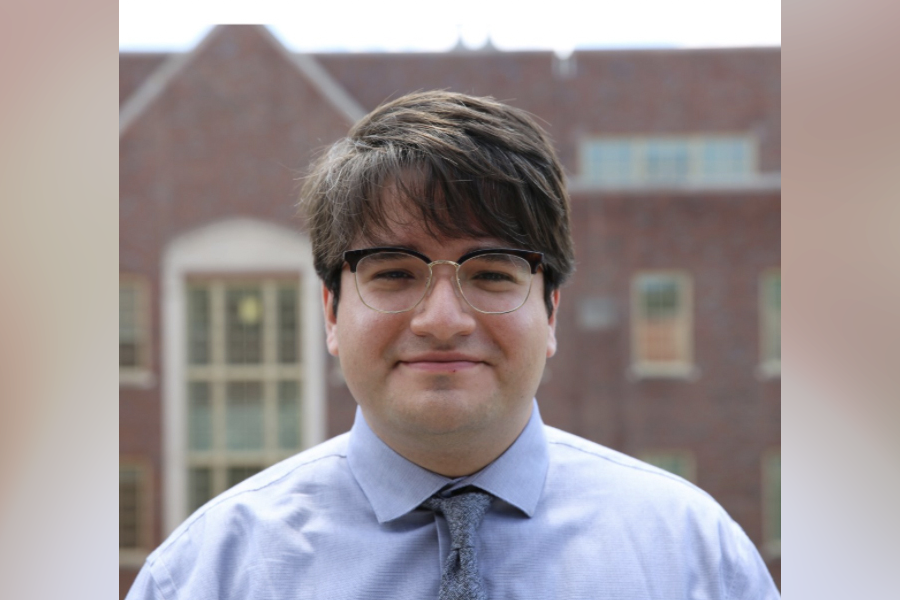Student Spotlight: Luis Sanchez

Luis Sanchez is a senior pursuing a bachelor’s degree in Classics with a major in Greek and Latin within the Department of Classics, and a minor in German via the Department of Modern Languages and Linguistics, both part of Florida State University’s College of Arts and Sciences. Sanchez won the Presidential Award for the Outstanding Undergraduate Student Paper with his submission “Sophocles’ ‘Antigone’ and the Biological Imperative to Marry” at the 2021 annual meeting of the Classical Association of the Middle West and South. He is slated to present “The Political Medicine of Asclepius in Plato’s ‘Republic’”, for which he won the David B. Ford Undergraduate Research and Creative Activity Award, at FSU’s 2021 President’s Showcase of Undergraduate Research Excellence in October.
What year are you in school, and when do you expect to graduate?
I am a fifth-year undergraduate student, and I plan on graduating in Spring 2022.
Tell us a little about your background, where you’re from and what brought you to FSU.
I was born and raised in South Florida, and I’m the son of parents who immigrated from South America. I came to FSU because of the stellar reputations of the university and its classics department.
What inspired you to pursue a major in Greek and Latin and a minor in German?
I’ve always loved languages and literatures, especially those from antiquity. Choosing classics was a no-brainer since the major combines all of these things, and it even throws in art and history! Ancient Greek and Latin are complex but rewarding, and they grant unfiltered access to the ancient texts that have continued to influence us for thousands of years. German was my more modern language pick, as I particularly like German literature, philosophy and music. German is also a great research tool to have, especially in the humanities.
What should people know about studying a foreign language? What advice do you have for students thinking of pursuing a second language?
People studying foreign languages should know that languages are not just undergraduate prerequisites, but windows into the countless cultures and histories of the world. Translations are great introductions, and I cannot bring myself to discourage reading translations of great literature, but nothing is more authentic and informative than the original. As for language learning advice, it’s just like music — practice daily.
What inspired you to write your award-winning paper, “Sophocles’ ‘Antigone’ and the Biological Imperative to Marry”?
This paper analyzes the undercurrents of the Hippocratic treatise “On the Diseases of Girls” in the “Antigone" by the ancient Greek tragedian Sophocles. The medical text discusses the risk young women were believed to face if they didn’t marry shortly after puberty, a situation similar to Antigone’s. The scholarship was missing a close, parallel reading of the two texts, so I figured I would offer it. I argued that the echoes of ancient medical thought throughout “Antigone” are nearly undeniable, and I found the project fascinating, combining my interests in ancient tragedy and medicine.
Tell us about “The Political Medicine of Asclepius in Plato’s ‘Republic’.” What inspired you to write this other award-winning paper?
This paper was inspired by the first question I asked associate professor of classics, Svetla Slaveva-Griffin, my introductory Greek professor and thesis director, during office hours. It seeks to examine the intersection of medicine and politics in Plato’s “Republic,” in which he uses the metaphor of medicine to parallel the body, city and soul. There is a very close study of the medical metaphor throughout “Republic,” which grants a clearer understanding of Plato’s understanding of health, order and justice.
What was your reaction when you found out that you won the CAMWS 2021 Undergraduate Presidential Award?
I was simply ecstatic. Everyone’s papers were interesting and compelling, so the good news really meant so much to me. Presenting among graduate students and professors was nerve-racking, but constructive. Hopefully, winning the award will translate into future success in writing and presenting research.
And when you won the David B. Ford Undergraduate Research and Creative Activity Award?
I was surprised and delighted to find out that I had won a named award. The first time I applied for an IDEA Grant, I wasn’t successful. I had to further refine my research proposal, and I sought additional summer programs that could be extra options for the grant’s funding. Most of the programs I applied to were canceled for summer 2021, but I was able to virtually attend the uncanceled German for Students of Classical Studies, hosted by the University of Cologne. My future research proposals will always be “pandemic-proof.”
What part of presenting at the President’s Showcase of Undergraduate Research Excellence are you most excited about?
I am most excited to discuss and share my topic in an interdisciplinary setting. Hopefully I can interest at least one other undergraduate, who may not have expected it, to take a closer look at antiquity studies.
What on-campus resources have helped you achieve success? Are there any faculty or staff who have helped or inspired you?
The staff and resources of FSU Libraries as well as the Center for Undergraduate Research and Academic Engagement have been tremendously important, and I owe my success to my mentor, Dr. Slaveva-Griffin. I must also thank associate professor of classics Trevor Luke and assistant professor of Italian Beth Coggeshall, who have offered me unrivaled guidance through these last few years. They invested a lot of time and believed in me well before others did. I hope to one day prove that their belief was not ill-founded.
Following your graduation, what are your plans? Even though you might miss FSU, what are you looking forward to once you graduate?
I plan on studying classics at the graduate level. Whether it be at a university or high school position, I would like nothing more than to share the beauty of classics with others through teaching and research.
